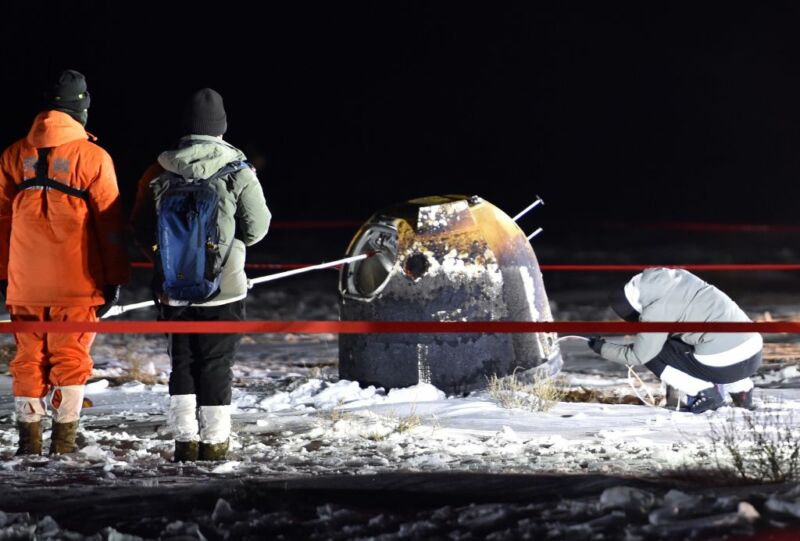
China's increasingly ambitious space program completed a 23-day mission on Wednesday that culminated in the return of about 2kg of rocks from the Moon. During the final phase of the mission, a singed spacecraft carrying the lunar cargo landed in Mongolia and was recovered by Chinese teams.
This Chang'e 5 mission represents a significant success for China and its space program, becoming only the third nation—after the United States with its crewed Apollo program and the Soviet Union with a robotic program in the 1970s—to return samples from the Moon.
During a post-landing news conference, Chinese officials said they would emulate the United States and Soviet Union in sharing the samples with international partners, including the United Nations. However, sharing material with the United States seems unlikely due to the Wolf Amendment, a law passed by Congress in 2011 that prohibits direct cooperation with China.
"The Chinese government is ready to share samples, including data, with all like-minded institutions from other countries," said Wu Yanhua, vice administrator of the China National Space Administration. However, he then called the Wolf Amendment adopted by Congress "unfortunate" and indicated direct cooperation with NASA would probably not occur.
Some US space officials, including former NASA Administrator Charles Bolden, have called for the Wolf Amendment to be rescinded and said the space agency should be allowed to work with China on current and future problems. The US Congress, however, has continued to block this due to concerns about the potential theft of US technology that might arise from such partnerships. It is not clear whether the Biden administration will review these rules.
Now that this mission is complete, China intends to continue expanding its lunar program. Next up, in a few years, the Chang'e 6 mission will seek to return 2kg of rocks from the Moon's South Pole and investigate the prevalence of water ice in the region. Future missions will include landers, bases, and more opportunities for scientific research.
During the news conference, Wu said the country would eventually send humans—called taikonauts in China—to the Moon but did not set a date for this mission. The country still must develop several technologies to make this happen. However, he said, when China does go to the Moon, it will be to conduct research and benefit humanity, not as part of some "space race" like the United States and Soviet Union undertook in the 1960s.
NASA is also interested in returning to the Moon with humans during the 2020s. Whether China's increasing interest in Earth's companion spurs Congress or the Biden administration to more fully fund NASA's Artemis program ambitions, however, will not be clear until the next couple of budget cycles are complete.
https://news.google.com/__i/rss/rd/articles/CBMia2h0dHBzOi8vYXJzdGVjaG5pY2EuY29tL3NjaWVuY2UvMjAyMC8xMi9jaGluYS1jb21wbGV0ZXMtbHVuYXItc2FtcGxpbmctbWlzc2lvbi1leWVzLW5leHQtc3RlcHMtb24tdGhlLW1vb24v0gFxaHR0cHM6Ly9hcnN0ZWNobmljYS5jb20vc2NpZW5jZS8yMDIwLzEyL2NoaW5hLWNvbXBsZXRlcy1sdW5hci1zYW1wbGluZy1taXNzaW9uLWV5ZXMtbmV4dC1zdGVwcy1vbi10aGUtbW9vbi8_YW1wPTE?oc=5
2020-12-17 15:53:00Z
52781247912939
Tidak ada komentar:
Posting Komentar